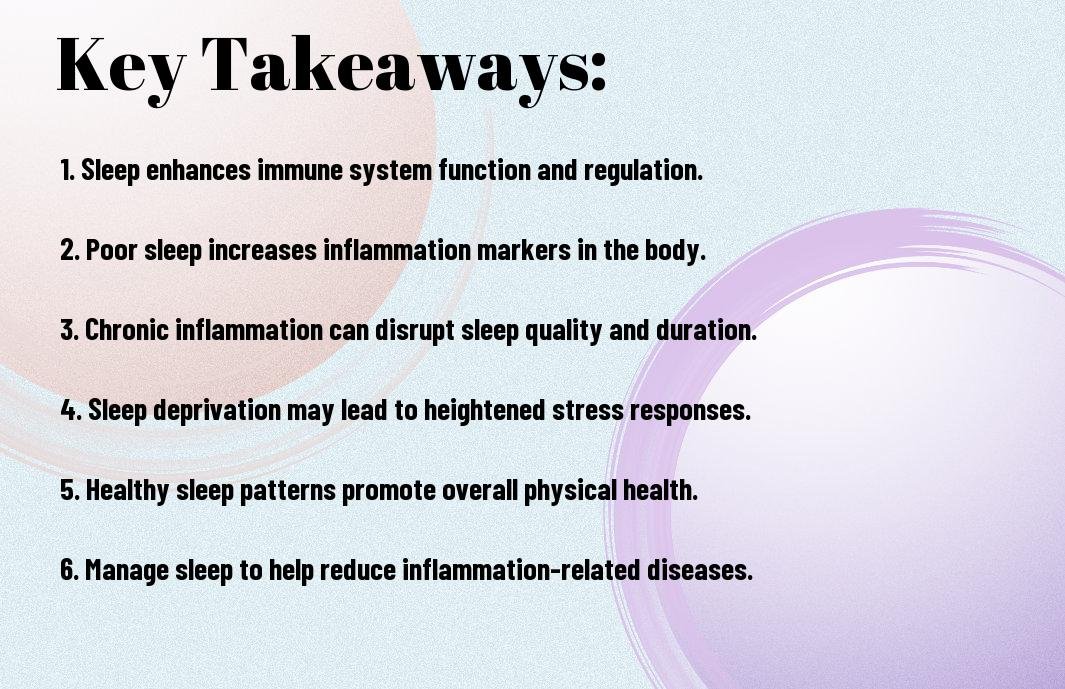As you lay in bed, your body is hard at work, fighting off inflammation that can lead to serious health problems. You may not realize it, but the amount of sleep you get each night has a direct impact on your immune system. During sleep, your body repairs and regenerates damaged cells, and a lack of sleep can cause chronic inflammation, leading to conditions like diabetes and heart disease. As you explore the connection between sleep and inflammation, you’ll discover how getting enough rest can be the key to a healthier life.
Key Takeaways:
- Research has shown a significant link between sleep and inflammation, with chronic sleep deprivation leading to increased levels of inflammatory markers in the body.
- During sleep, the body repairs and regenerates damaged cells, and a lack of sleep can disrupt this process, leading to increased oxidative stress and inflammation.
- Chronic inflammation has been linked to various diseases, including arthritis, diabetes, and cardiovascular disease, highlighting the importance of sleep in maintaining overall health.
- Sleep disorders, such as insomnia and sleep apnea, can further exacerbate inflammation and increase the risk of developing related diseases.
- Establishing a consistent sleep schedule and practicing relaxation techniques, such as meditation and deep breathing, can help reduce inflammation and promote overall wellbeing.

Sleep and Inflammation: The Basics
Your body’s connection to sleep and inflammation is more intimate than you think, and understanding this relationship can help you take control of your overall health.
Definition of Sleep and Inflammation
Above all, it’s crucial to define these two concepts: sleep is the state of rest your body needs to function, while inflammation is your body’s natural defense mechanism against harm.
The Importance of Sleep for Overall Health
At the heart of your well-being is the need for quality sleep, which plays a significant role in maintaining your physical and mental health, and preventing chronic diseases.
Indeed, when you don’t get enough sleep, your body’s can be triggered, leading to a range of serious health issues, including cardiovascular disease, diabetes, and even cancer; on the other hand, getting enough sleep can help regulate your immune system and reduce inflammation, ultimately leading to a healthier and happier you.
The Science Behind Sleep and Inflammation
The connection between sleep and inflammation is complex, and Why Is Inflammation Worse at Night? is a question you may ask yourself. As you research into the world of sleep and inflammation, you’ll discover that your body’s immune system plays a significant role.
How Sleep Affects the Immune System
After a good night’s sleep, you’ll notice that your immune system is stronger, and inflammation is reduced. During sleep, your body produces anti-inflammatory cytokines that help to fight off infections and inflammation.
The Role of Cytokines in Inflammation
Inflammation triggers the production of pro-inflammatory cytokines, which can lead to chronic inflammation and serious health issues. As you learn more about cytokines, you’ll understand how they affect your body’s inflammatory response.
Even more interesting is the fact that sleep deprivation can disrupt the balance of cytokines in your body, leading to increased inflammation and a weaker immune system. As you prioritize your sleep, you’ll be better equipped to fight off infections and diseases, and reduce your risk of chronic inflammation.
Consequences of Poor Sleep on Inflammation
Keep in mind that poor sleep can lead to increased inflammation in your body, which is linked to various health issues. You can find more information on Sleep Disturbance, Sleep Duration, and Inflammation to understand the connection better.
Increased Risk of Chronic Diseases
Around the time you experience poor sleep, your risk of developing chronic diseases like diabetes and heart disease increases, putting your overall health in danger.
Impact on Mental Health
Poor sleep quality can have a significant impact on your mental health, leading to depression and anxiety.
Sleep deprivation can further exacerbate mental health issues, making it harder for you to manage stress and emotional regulation. As you continue to experience poor sleep, you may notice a decline in your overall well-being, making it imperative to address sleep disorders to prevent long-term damage to your mental health.

Lifestyle Factors that Affect Sleep and Inflammation
Not all factors that affect your sleep and inflammation are within your control, but some can impact your well-being, including:
- Diet
- Exercise
- Stress
The connection between these factors and your sleep and inflammation is complex.
Diet and Exercise
Beneath the surface of your daily routine, your diet and exercise habits play a significant role in your sleep quality and inflammation levels, affecting your overall health.
Stress and Relaxation Techniques
Exercising control over your stress levels through relaxation techniques can help mitigate the negative effects of inflammation and improve your sleep.
And as you investigate deeper into the world of stress and relaxation techniques, you’ll discover that chronic stress can lead to inflammation and sleep disorders, while practices like meditation and deep breathing can have a positive impact on your overall well-being, reducing inflammation and improving sleep quality.

Sleep Disorders and Inflammation
To understand the connection between sleep and inflammation, you need to consider the impact of sleep disorders on your body. Sleep disorders can lead to increased inflammation, which can have severe consequences for your overall health.
Sleep Apnea and Its Effects
Along with other sleep disorders, sleep apnea can cause significant inflammation in your body, leading to serious health problems such as heart disease and stroke. You may experience frequent interruptions in your sleep, causing chronic inflammation and related issues.
Insomnia and Chronic Inflammation
Before you realize it, insomnia can take a toll on your body, causing chronic inflammation and related health issues. You may feel tired and weak, making it difficult to perform daily tasks, and increasing your risk of diseases such as diabetes and cancer.
And as you explore deeper into the relationship between insomnia and chronic inflammation, you will find that prolonged sleep deprivation can have devastating effects on your body, including weakened immune systems and increased mortality rates. You should be aware of these dangerous consequences and take steps to address your insomnia, such as establishing a consistent sleep schedule and creating a relaxing sleep environment.

Managing Sleep and Inflammation
Despite the challenges, you can take control of your sleep and inflammation. Research on Sleep Loss and Inflammation – PMC shows that establishing a healthy sleep schedule is key.
Establishing a Healthy Sleep Schedule
Around this time, you should start prioritizing your sleep, aiming for 7-9 hours of sleep each night to help regulate inflammation in your body.
Reducing Stress and Anxiety
At the end of the day, you can reduce stress and anxiety by practicing relaxation techniques, such as meditation or deep breathing.
Sleep is imperative for your overall health, and when you don’t get enough, it can lead to chronic inflammation, which can have severe consequences on your body, including an increased risk of disease. By reducing stress and anxiety, you can improve the quality of your sleep, helping to keep inflammation at bay and protect your health.
Final Words
Presently, you understand the intimate link between sleep and inflammation. You’ve learned how your body’s inflammatory response is tied to your sleep patterns. As you move forward, consider your sleep’s impact on your overall health, and take steps to prioritize a restful night’s sleep to minimize your risk of chronic inflammation and its devastating effects on your well-being. Your body will thank you, and you’ll wake up feeling refreshed and ready to tackle the day ahead.
FAQ
Q: What is the relationship between sleep and inflammation in the body?
A: Sleep and inflammation are closely linked, as sleep plays a significant role in regulating the body’s inflammatory response. During sleep, the body produces anti-inflammatory cytokines, which help to reduce inflammation, while also clearing out pro-inflammatory cytokines that can cause inflammation. Chronic sleep deprivation, on the other hand, can lead to increased levels of pro-inflammatory cytokines, resulting in chronic inflammation, which is associated with various diseases, including cardiovascular disease, diabetes, and cancer.
Q: How does lack of sleep affect the body’s inflammatory response?
A: When we don’t get enough sleep, our body’s inflammatory response is disrupted, leading to an increase in pro-inflammatory cytokines. This can cause inflammation in various parts of the body, including the cardiovascular system, digestive system, and nervous system. Additionally, sleep deprivation can also lead to changes in the gut microbiome, which can further exacerbate inflammation. As a result, chronic sleep deprivation can increase the risk of developing inflammatory diseases, such as arthritis, and can also worsen existing conditions.
Q: Can sleep disorders, such as insomnia, contribute to inflammation?
A: Yes, sleep disorders, including insomnia, can contribute to inflammation. Insomnia, in particular, has been shown to increase the production of pro-inflammatory cytokines, leading to chronic inflammation. This is because insomnia can disrupt the body’s natural sleep-wake cycle, leading to a state of chronic stress, which can trigger the production of pro-inflammatory chemicals. Furthermore, insomnia can also lead to changes in behavior, such as a poor diet and lack of exercise, which can further contribute to inflammation.
Q: How can getting enough sleep help reduce inflammation?
A: Getting enough sleep is crucial for regulating the body’s inflammatory response. During sleep, the body produces anti-inflammatory cytokines, which help to reduce inflammation, and clears out pro-inflammatory cytokines that can cause inflammation. Additionally, sleep helps to regulate the body’s stress response, which can also contribute to inflammation. Aim for 7-9 hours of sleep per night to help reduce inflammation and promote overall health. Establishing a consistent sleep schedule, avoiding caffeine and electronics before bedtime, and creating a relaxing sleep environment can also help improve sleep quality and reduce inflammation.
Q: Are there any specific sleep recommendations for reducing inflammation?
A: Yes, there are several sleep recommendations that can help reduce inflammation. In addition to aiming for 7-9 hours of sleep per night, it’s also important to establish a consistent sleep schedule and create a relaxing sleep environment. This can include avoiding caffeine and electronics before bedtime, keeping the bedroom cool, dark, and quiet, and avoiding stimulating activities before bedtime. Additionally, practicing relaxation techniques, such as meditation or deep breathing, before bedtime can also help reduce stress and promote better sleep, which can help reduce inflammation. By prioritizing sleep and making healthy lifestyle choices, individuals can help reduce their risk of chronic inflammation and promote overall health and wellbeing.



